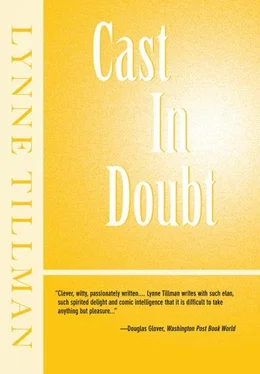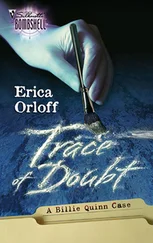She inquires if I am killing Gypsies in my next crime story. Certainly not, I assure her, nothing of the sort. It is research for myself, for a special project inspired by Helen. I explain that Helen is most likely off with a young Gypsy woman, and that I have become interested in the subject. It is Gwen’s turn now to harrumph, Quel exotic. She brings up a letter I once wrote her in which I went on at considerable length about some Gypsies here, who I thought had stolen from me. I am forced to admit that I am prejudiced against them, but find this a failing in myself, I tell her, and then I go on, no doubt pompously, about how, if one studies a subject, or engages it in a serious way, it becomes impossible to hold on to the same prejudices. Gwen contends that my belief in the power of reason ought to be examined, that prejudice is not reasonable. Though I wouldn’t know about that, she expands listlessly. She laughs again. She is nothing if not ironic; and I ought to take her up, I know, but I have launched into a train of thought that leads to the conclusion that we study what we hate as much as what we love. Yes, Gwen says, we study our demons. And our demons won’t let us go, Lulu. For a second Gwen appears desperate, at a loss when she is never at a loss — for words at least. I don’t know what to do or say. She tells me to forget it. She says she’s quite all right, just a little tight.
Did I look stricken? I wonder. How I hate being given away by my eyes, by myself. I offer her some cheese and bread — the bread is a bit stale, like that metaphor she offered about her group. She eats a bit and complains that I am in no way a Jewish mother. Perhaps I’m a Greek mother, I say. Does that mean I am a father? We laugh together and some of the tension passes. Then I announce, with no little anxiety, that John, a handsome young musician, an ex-beau of Helen’s from New York, will be here tomorrow to see about building bookshelves. Gwen and he will certainly meet, and in anticipation of that meeting, I must explain his presence beforehand, I believe. I don’t want any more unruly surprises. Gwen shoots a knowing we’ve-been-here-before look at me. I expected this. I can keep nothing from her, at least nothing that is about love or lust. To deflect her curiosity, I remark, rather more loudly than I want, You’re making quite a name for yourself, dear. John knew who you were. Gwen grimaces, inhales deeply and sips her wine. She asks rhetorically, because how would I, out-of-touch Horace, know if she ever slept with him. You know how forgetful I am, she says; then inquires disinterestedly, he’s staying with Alicia? Such a woman. She emphasizes woman. Clearly Gwen remembers that she doesn’t like Alicia, but I don’t remind Gwen that that aspect of her supposedly bad memory has not suffered injury. Also I don’t repeat that John referred to Gwen as old. I have no desire to hurt her.
Perhaps Gwen grimaces because she is nearsighted. She refuses to wear glasses. I have learned to accept the fact that she subscribes to Parker’s “men seldom make passes at girls who wear glasses.” As I said, I do believe she is very much like Parker. Gwen is vain. Often she cannot recognize friends on the street or at a party unless they are right in front of her. She uses this to her advantage — she can shun people and seem not to and can always say, I didn’t see you. I’m as blind as a bat. Then she might wink. The literary line which divides her face cryptically, or critically — it is doing so now — allows her the liberty of ambiguity, or rather the solace of ambiguity.
I’m throwing a party for you, dear. I’ll invite everyone. Tout le monde . Gwen smiles and grimaces. She hopes that I serve food, so that people don’t retch all night and the next day, as they did in Cambridge that time, our last and most infamous New Year’s Eve party, which ended in a near-riot. Recalling it makes me laugh uproariously. I twist or roll in the chair and hold my sides, then lose my breath and begin to hiccup. Gwen watches me steadily, with some concern. You don’t laugh enough, Lulu, you’re out of shape. When the hiccups stop and I catch my breath, I explain that memories have come flooding in. Of our friends vomiting? she asks, deadpan. I shake my head and start to laugh again. I was also thinking of much more pleasant things. Remember Peter collapsing into his lover’s arms? Pleasant, Gwen retorts. I ignore her. Remember George, absolutely blotto, collapsing, after much Scotch and many pills, remember how he crashed upon the table like a giant redwood cut at the stem? Timber, we shouted. Timbers we called him afterward, for a long time. He’s gone, Gwen notes cryptically.
Perhaps it is the mention of death itself that is cryptic. Or those times at that café, I go on, I forget the name of it now — and our arguments about New Criticism with the social realists. This in turn reminds me of a recent argument I had with Roger. He believes that a work of art’s greatness can be measured by the difficulty with which it can be copied. Gwen finds this viewpoint hilarious, as do I. Roger claimed, repeatedly, as if speaking to a dead man, that a Vermeer couldn’t be copied. But I won the argument by insisting that a Jackson Pollock would be much harder to copy, as it was executed not by the careful application of paint but by employing randomness. How, I said to him, my voice mounting in vehemence, just how would you copy, exactly and precisely, a splat? A three-dimensional splat at that? Gwen salutes me.
I prefer Picasso to Pollock, though Gwen doesn’t. Quel stupid is your Roger, says she. How do you stay here, she asks again, if you have to engage in boring arguments like that? Please, Gwen, I answer, with more annoyance than I mean to show, let us decide that this subject is off season, shall we? I am here, that is all. You are in New York and from what you report, it is not so marvelous there either, and we will not have a pleasant time together if you keep harping on this place and its obvious inadequacies. I enjoy these inadequacies. And why not, I think to myself, enjoy them. All right, Lulu, Gwen nods, and studies me in her inimitable way. All right, Lulu, you win. You witness the demise of a scold. She suggests that we drink to our inadequacies, which we do. The matter is as much as resolved. An understanding has been reached on the subject.
The rest of the night speeds away. Somehow, attempting to envision it now, I see an image, myself lying on the floor absolutely still — I am pretending to be a log. This may have had to do with Gwen’s wordplay about letting sleeping logs lie, and so forth. I seem to recall something like that. Or it may have had to do with another mention of our dead friend Timbers. Or it may have been produced when I was laughing and rolling like a log.
In the morning Gwen’s pumps are still on the floor under the chaise longue. She is nowhere in sight and Yannis too has disappeared. With her shoes there, it’s as if she’d melted into thin air, like the city of Oz or, more ominously, like the Wicked Witch. Melting has a mysterious and fluid quality to it that attaches itself to Gwen, who has a wonderful plasticity to her. She can fit herself into so many scenes, as John might put it. But Gwen is not magical in the way that Helen is, I mean, not as mysterious to me. Mystery might have its roots in magic. Gwen has her feet on the ground, even if she abandons her shoes. As for Yannis’ absence, about this I experience some trepidation. On the other hand, John will come soon, and would I really care to have Yannis hanging about being surly?
Part 2. The Strange Disorder
It occurs to me that part of this story transpired before certain revelations, before some events occurred which disturbed my peace and the pace of this narrative, such as it is, which I was in no way able to predict or even to imagine. Looking back on it, the life I lived and am recording had been orderly and relatively contained. But at the time I lived it, I sensed myself, inarticulately, to be not quite in it, holding on rather tentatively, threatened by something, a presence or other who might be waiting in the wings, and who might make me lose my way, lose my grip. I was always at the brink of that, staving it off. Dante expresses it so elegantly: Nel mezzo del cammin di nostra vita / mi ritrovai per una selva oscura / chè la diritta via era smarrita . Yes, “In the middle of the journey of our life, I came to my senses in a dark forest, for I had lost the straight path.”
Читать дальше












